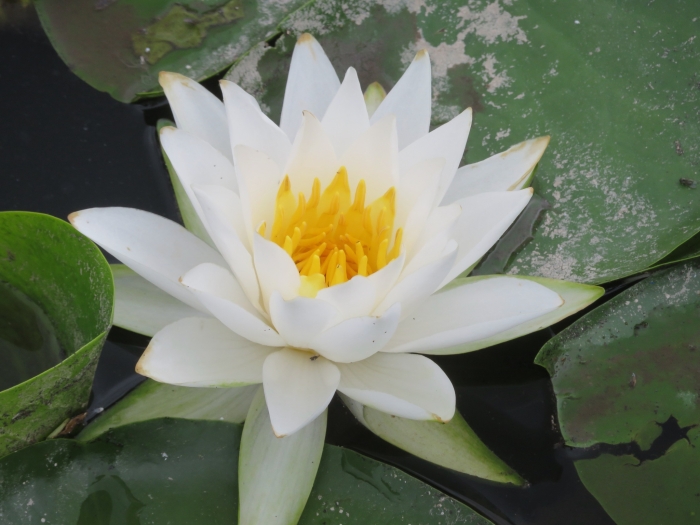White Water Lily
(Nymphaea alba)
White Water Lily (Nymphaea alba)
/
/

© belvedere04
CC BY 4.0
Image By:
© belvedere04
Recorded By:
Copyright:
CC BY 4.0
Copyright Notice:
Photo by: © belvedere04 | License Type: CC BY 4.0 | License URL: http://creativecommons.org/licenses/by/4.0/ | Uploader: belvedere04 | Publisher: iNaturalist |

























Estimated Native Range
Summary
Nymphaea alba, commonly known as the White Water Lily, is an aquatic perennial herb native to still or slow-moving freshwater habitats such as ponds, lakes, and slow streams across North Africa, temperate Asia, and Europe. It thrives in water depths of 12-59 inches and prefers nutrient-rich substrates. The plant features large, round, floating leaves that can reach up to 12 inches in diameter, creating a spread of up to 59 inches across the water’s surface. From June to September, it produces showy white flowers with numerous yellow stamens at the center, which are highly fragrant and can be up to 10 inches across.
The White Water Lily is valued for its ornamental beauty, with its pristine white flowers providing a striking contrast against the dark water, and is often used in water gardens and ornamental ponds. It is also recognized for its ecological benefits, providing habitat and shelter for aquatic life. In cultivation, Nymphaea alba requires full sun to part shade and still or slow-moving water. It is relatively low maintenance once established but may require division every few years to manage growth. While it has historical uses in traditional herbal medicine for its sedative and aphrodisiac properties, due to the presence of active alkaloids such as nupharine and nymphaeine, caution is advised as parts of the plant can be toxic if ingested. Gardeners should be aware of its potential invasiveness when grown outside its native range and consult local regulations before planting.CC BY-SA 4.0
The White Water Lily is valued for its ornamental beauty, with its pristine white flowers providing a striking contrast against the dark water, and is often used in water gardens and ornamental ponds. It is also recognized for its ecological benefits, providing habitat and shelter for aquatic life. In cultivation, Nymphaea alba requires full sun to part shade and still or slow-moving water. It is relatively low maintenance once established but may require division every few years to manage growth. While it has historical uses in traditional herbal medicine for its sedative and aphrodisiac properties, due to the presence of active alkaloids such as nupharine and nymphaeine, caution is advised as parts of the plant can be toxic if ingested. Gardeners should be aware of its potential invasiveness when grown outside its native range and consult local regulations before planting.CC BY-SA 4.0
Plant Description
- Plant Type: Herb
- Height: 0.2-0.3 feet
- Width: 3-5 feet
- Growth Rate: Slow, Moderate
- Flower Color: White
- Flowering Season: Spring, Summer, Fall
- Leaf Retention: Deciduous
Growth Requirements
- Sun: Full Sun
- Water: Aquatic
- Drainage: Standing
Common Uses
Fragrant, Low Maintenance, Water Garden
Natural Habitat
Still or slow-moving freshwater habitats such as ponds, lakes, and slow streams across North Africa, temperate Asia, and Europe
Other Names
Common Names: White Water Rose, Große Seerose, White Water-Lily, White Lotus
Scientific Names: , Nymphaea alba, Castalia alba, Castalia alba, Castalia alba var. depressa, Castalia alba var. minor, Castalia alba var. oviformis, Castalia alba var. sphaerocarpa, Castalia alba var. urceolata, Castalia biradiata
GBIF Accepted Name: